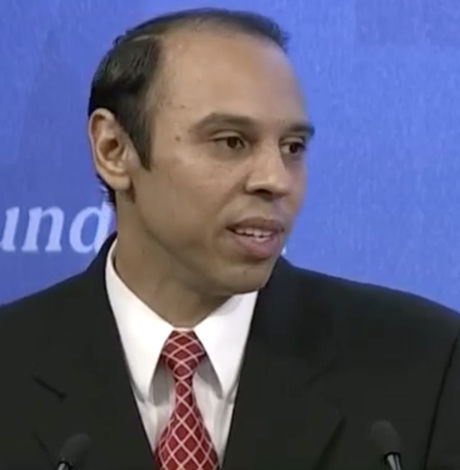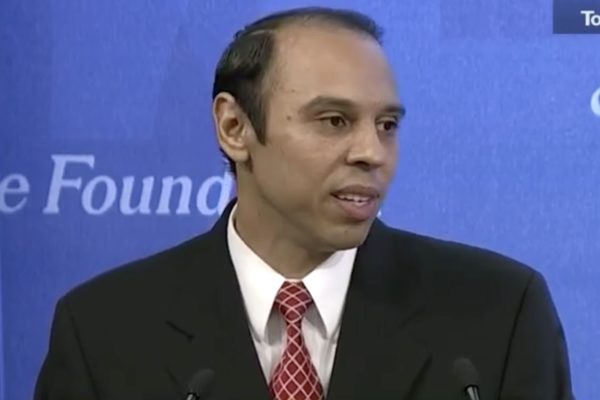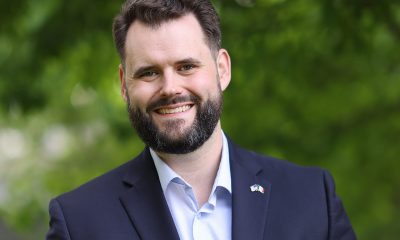National
Trump’s HHS appoints anti-trans activist to protect trans health
Severino a former staffer with the anti-LGBT Heritage Foundation


Roger Severino, director of the DeVos Center for Religion and Civil Society, Institute for Family, Community, and Opportunity at the Heritage Foundation. (Image courtesy C-Span)
A series of statements from LGBT advocates came out Thursday over the appointment of Roger Severino, who until this week was director of the DeVos Center for Religion & Civil Society for the Heritage Foundation.
Winnie Stachelberg, executive vice president for external affairs at the Center for American Progress, gave no quarter in a statement over the Severino’s appointment and its implications for transgender health.
“Frankly, it is sick that President Trump would appoint Roger Severino to lead OCR – putting a man who made his career opposing healthcare non-discrimination laws in charge of enforcing those very same protections,” Stachelberg said. “Before the Affordable Care Act, insurance companies routinely denied equal treatment to same-sex couples and more than half of private insurance plans explicitly discriminated against transgender patients, with more than a quarter of transgender people reported being denied medical care by a provider. Severino’s writing makes it clear that he wants to take us back to the days when 1 in 4 transgender people was refused medical care outright.”
Among the posts Severino wrote for The Daily Signal, the blog for the Heritage Foundation, were in opposition to LGBT people, especially transgender rights. After the White House came out against a provision in a congressional defense spending package that would have allowed anti-LGBT discrimination among federal contractors, Severino wrote a post called “Obama Threatens to Veto Military Bill Because It Protects Religious Groups.” After the Pentagon lifted its ban on openly transgender service, Severino wrote a post called “Pentagon’s Transgender Policy Defies Common Sense.”
Severino also defended North Carolina’s anti-LGBT House Bill 2, which prohibits transgender people from using the restroom in schools and government buildings consistent with their gender identity. Decrying the “unrelenting and coordinated attacks” against the state for enacting the law, Severino criticized former U.S. Attorney General Loretta Lynch for filing a federal lawsuit against the measure, which he said amounted to progressives “using government power to coerce everyone, including children, into pledging allegiance to a radical new gender ideology.”
Marguerite Bowling, a spokesperson for the Heritage Foundation, defended Severino in response to concerns he’d seek to undermine transgender health in his role at HHS.
“Roger Severino has a distinguished record of fighting for the civil rights and freedoms of all Americans,” Severino said. “We have no doubt that Roger in his new role at HHS will protect the civil rights of all Americans.”
As head of the HHS civil rights division, Severino would be charged with enforcing Section 1557 of Obamacare, which prohibits discrimination on the basis of race, sex, disability and age in health programs. The Obama administration interpreted the prohibiting on sex discrimination to bar discrimination against transgender people in health care, including the refusal of gender reassignment surgery.
Wade Henderson, outgoing CEO of the Leadership Conference on Civil & Human Rights, said in a statement the office of civil rights at HHS requires “strong and experienced leadership” to enforce Section 1557, and Severino is “not that leader.”
“Since enactment of the ACA seven years ago today, members of The Leadership Conference have strongly advocated for the full and complete implementation of Section 1557,” Henderson said. “In his previous position at the Heritage Foundation, Mr. Severino repeatedly denounced and actively worked to oppose OCR’s implementation of Section 1557. These actions call into question his ability to fully enforce the ACA and protect communities of color and other underserved populations, who are most at risk for unequal access to health and health care.”
It should be noted U.S. District Judge Reed O’Connor has enjoined the enforcement of the Obamacare regulation interpreting Section 1557 to apply to transgender people. The Trump administration missed a deadline to appeal the decision to the U.S. Fifth Circuit Court of Appeals, but the American Civil Liberties Union is seeking to intervene to defend the regulation.
Harper Jean Tobin, policy director for the National Center for Transgender Equality, said Severino could still do “a number of things” to impact transgender protections under Section 1557 as litigation proceeds.
“The government will now have to make a decision, and OCR is ostensibly the client DOJ in this decision, as to whether to ensure, as the government normally would in a case like this, that federal law and the federal regulation interpreting it and applying the federal law is defended, that a rule overturning it is reviewed by a higher court,” Tobin said. “I think the fear is that OCR and DOJ could sort of work together to have this injunction made permanent without any review by a higher court, which would be highly unusual and really inappropriate.”
After a rule-making process consisting of many years and with two separate comment periods, Tobin said letting the injunction against the regulation stand would be “tantamount to repealing the regulation without going the required rule-making process and instead just acceding to a fringe legal position by one district court judge.”
Tobin added OCR has other responsibilities related to transgender health, such as the federal health care privacy law, or HIPAA, which assures privacy for transgender people in health care settings.
“Up until now, OCR has in cases involving transgender people, just as it does for everybody else, acted to enforce the laws to protect their privacy, but given Mr. Severino’s aggressively hostile work to dismantle any kind of legal protections for transgender people, we’re worried about what kind of direction the agencies would take on those bedrock protections,” Tobin said.
Caitlyn Oakley, an HHS spokesperson, had no comment in response to concerns from LGBT advocacy groups that Severino wouldn’t protect transgender health in his new role.
“We aren’t commenting on personnel at this time,” Oakley said.
Matt McTighe, executive director of Freedom for All Americans, said in a statement Severino appointment to HHS and his anti-trans history spells trouble for transgender health.
“Roger Severino has a proven track record of opposing fair and equal treatment for the transgender community,” McTighe said. “He is a dangerous pick for a position that is meant to enforce critical civil rights protections. This is yet another example of the Trump administration’s failure to live up to the president’s campaign promise of protecting LGBT people and it will have devastating consequences for transgender people across the country.”
Florida
DNC slams White House for slashing Fla. AIDS funding
State will have to cut medications for more than 16,000 people

The Trump-Vance administration and congressional Republicans’ “Big Beautiful Bill” could strip more than 10,000 Floridians of life-saving HIV medication.
The Florida Department of Health announced there would be large cuts to the AIDS Drug Assistance Program in the Sunshine State. The program switched from covering those making up to 400 percent of the Federal Poverty Level, which was anyone making $62,600 or less, in 2025, to only covering those making up to 130 percent of the FPL, or $20,345 a year in 2026.
Cuts to the AIDS Drug Assistance Program, which provides medication to low-income people living with HIV/AIDS, will prevent a dramatic $120 million funding shortfall as a result of the Big Beautiful Bill according to the Florida Department of Health.
The International Association of Providers of AIDS Care and Florida Surgeon General Joseph Ladapo warned that the situation could easily become a “crisis” without changing the current funding setup.
“It is a serious issue,” Ladapo told the Tampa Bay Times. “It’s a really, really serious issue.”
The Florida Department of Health currently has a “UPDATES TO ADAP” warning on the state’s AIDS Drug Assistance Program webpage, recommending Floridians who once relied on tax credits and subsidies to pay for their costly HIV/AIDS medication to find other avenues to get the crucial medications — including through linking addresses of Florida Association of Community Health Centers and listing Florida Non-Profit HIV/AIDS Organizations rather than have the government pay for it.
HIV disproportionately impacts low income people, people of color, and LGBTQ people
The Tampa Bay Times first published this story on Thursday, which began gaining attention in the Sunshine State, eventually leading the Democratic Party to, once again, condemn the Big Beautiful Bill pushed by congressional republicans.
“Cruelty is a feature and not a bug of the Trump administration. In the latest attack on the LGBTQ+ community, Donald Trump and Florida Republicans are ripping away life-saving HIV medication from over 10,000 Floridians because they refuse to extend enhanced ACA tax credits,” Democratic National Committee spokesperson Albert Fujii told the Washington Blade. “While Donald Trump and his allies continue to make clear that they don’t give a damn about millions of Americans and our community, Democrats will keep fighting to protect health care for LGBTQ+ Americans across the country.”
More than 4.7 million people in Florida receive health insurance through the federal marketplace, according to KKF, an independent source for health policy research and polling. That is the largest amount of people in any state to be receiving federal health care — despite it only being the third most populous state.
Florida also has one of the largest shares of people who use the AIDS Drug Assistance Program who are on the federal marketplace: about 31 percent as of 2023, according to the Tampa Bay Times.
“I can’t understand why there’s been no transparency,” David Poole also told the Times, who oversaw Florida’s AIDS program from 1993 to 2005. “There is something seriously wrong.”
The National Alliance of State and Territorial AIDS Directors estimates that more than 16,000 people will lose coverage
U.S. Supreme Court
Competing rallies draw hundreds to Supreme Court
Activists, politicians gather during oral arguments over trans youth participation in sports

Hundreds of supporters and opponents of trans rights gathered outside of the United States Supreme Court during oral arguments for Little v. Hecox and West Virginia v. B.P.J. on Tuesday. Two competing rallies were held next to each other, with politicians and opposing movement leaders at each.
“Trans rights are human rights!” proclaimed U.S. Sen. Ed Markey (D-Mass.) to the crowd of LGBTQ rights supporters. “I am here today because trans kids deserve more than to be debated on cable news. They deserve joy. They deserve support. They deserve to grow up knowing that their country has their back.”

“And I am here today because we have been down this hateful road before,” Markey continued. “We have seen time and time again what happens when the courts are asked to uphold discrimination. History eventually corrects those mistakes, but only after the real harm is done to human beings.”
View on Threads
U.S. Education Secretary Linda McMahon spoke at the other podium set up a few feet away surrounded by signs, “Two Sexes. One Truth.” and “Reality Matters. Biology Matters.”
“In just four years, the Biden administration reversed decades of progress,” said McMahon. “twisting the law to urge that sex is not defined by objective biological reality, but by subjective notion of gender identity. We’ve seen the consequences of the Biden administration’s advocacy of transgender agendas.”

U.S. Rep. Mark Takano (D-Calif.), chair of the Congressional Equality Caucus, was introduced on the opposing podium during McMahon’s remarks.
“This court, whose building that we stand before this morning, did something quite remarkable six years ago.” Takano said. “It did the humanely decent thing, and legally correct thing. In the Bostock decision, the Supreme Court said that trans employees exist. It said that trans employees matter. It said that Title VII of the Civil Rights Act protects employees from discrimination based on sex, and that discrimination based on sex includes discrimination based on gender identity and sexual orientation. It recognizes that trans people have workplace rights and that their livelihoods cannot be denied to them, because of who they are as trans people.”
“Today, we ask this court to be consistent,” Takano continued. “If trans employees exist, surely trans teenagers exist. If trans teenagers exist, surely trans children exist. If trans employees have a right not to be discriminated against in the workplace, trans kids have a right to a free and equal education in school.”
Takano then turned and pointed his finger toward McMahon.
“Did you hear that, Secretary McMahon?” Takano addressed McMahon. “Trans kids have a right to a free and equal education! Restore the Office of Civil Rights! Did you hear me Secretary McMahon? You will not speak louder or speak over me or over these people.”
Both politicians continued their remarks from opposing podiums.
“I end with a message to trans youth who need to know that there are adults who reject the political weaponization of hate and bigotry,” Takano said. “To you, I say: you matter. You are not alone. Discrimination has no place in our schools. It has no place in our laws, and it has no place in America.”
U.S. Supreme Court
Supreme Court hears arguments in two critical cases on trans sports bans
Justices considered whether laws unconstitutional under Title IX.

The Supreme Court heard two cases today that could change how the Equal Protection Clause and Title IX are enforced.
The cases, Little v. Hecox and West Virginia v. B.P.J., ask the court to determine whether state laws blocking transgender girls from participating on girls’ teams at publicly funded schools violates the 14th Amendment’s Equal Protection Clause and Title IX. Once decided, the rulings could reshape how laws addressing sex discrimination are interpreted nationwide.
Chief Justice John Roberts raised questions about whether Bostock v. Clayton County — the landmark case holding that Title VII of the Civil Rights Act of 1964 protects employees from discrimination based on sexual orientation or gender identity — applies in the context of athletics. He questioned whether transgender girls should be considered girls under the law, noting that they were assigned male at birth.
“I think the basic focus of the discussion up until now, which is, as I see it anyway, whether or not we should view your position as a challenge to the distinction between boys and girls on the basis of sex or whether or not you are perfectly comfortable with the distinction between boys and girls, you just want an exception to the biological definition of girls.”
“How we approach the situation of looking at it not as boys versus girls but whether or not there should be an exception with respect to the definition of girls,” Roberts added, suggesting the implications could extend beyond athletics. “That would — if we adopted that, that would have to apply across the board and not simply to the area of athletics.”
Justice Clarence Thomas echoed Roberts’ concerns, questioning how sex-based classifications function under Title IX and what would happen if Idaho’s ban were struck down.
“Does a — the justification for a classification as you have in Title IX, male/female sports, let’s take, for example, an individual male who is not a good athlete, say, a lousy tennis player, and does not make the women’s — and wants to try out for the women’s tennis team, and he said there is no way I’m better than the women’s tennis players. How is that different from what you’re being required to do here?”
Justice Samuel Alito addressed what many in the courtroom seemed reluctant to state directly: the legal definition of sex.
“Under Title IX, what does the term ‘sex’ mean?” Alito asked Principal Deputy Solicitor General Hashim Mooppan, who was arguing in support of Idaho’s law. Mooppan maintained that sex should be defined at birth.
“We think it’s properly interpreted pursuant to its ordinary traditional definition of biological sex and think probably given the time it was enacted, reproductive biology is probably the best way of understanding that,” Mooppan said.
Justice Sonia Sotomayor pushed back, questioning how that definition did not amount to sex discrimination against Lindsay Hecox under Idaho law. If Hecox’s sex is legally defined as male, Sotomayor argued, the exclusion still creates discrimination.
“It’s still an exception,” Sotomayor said. “It’s a subclass of people who are covered by the law and others are not.”
Justice Elena Kagan highlighted the broader implications of the cases, asking whether a ruling for the states would impose a single definition of sex on the 23 states that currently have different laws and standards. The parties acknowledged that scientific research does not yet offer a clear consensus on sex.
“I think the one thing we definitely want to have is complete findings. So that’s why we really were urging to have a full record developed before there were a final judgment of scientific uncertainty,” said Kathleen Harnett, Hecox’s legal representative. “Maybe on a later record, that would come out differently — but I don’t think that—”

“Just play it out a little bit, if there were scientific uncertainty,” Kagan responded.
Justice Brett Kavanaugh focused on the impact such policies could have on cisgender girls, arguing that allowing transgender girls to compete could undermine Title IX’s original purpose.
“For the individual girl who does not make the team or doesn’t get on the stand for the medal or doesn’t make all league, there’s a — there’s a harm there,” Kavanaugh said. “I think we can’t sweep that aside.”
Justice Amy Coney Barrett questioned whether Idaho’s law discriminated based on transgender status or sex.
“Since trans boys can play on boys’ teams, how would we say this discriminates on the basis of transgender status when its effect really only runs towards trans girls and not trans boys?”
Harnett responded, “I think that might be relevant to a, for example, animus point, right, that we’re not a complete exclusion of transgender people. There was an exclusion of transgender women.”
Justice Ketanji Brown Jackson challenged the notion that explicitly excluding transgender people was not discrimination.
“I guess I’m struggling to understand how you can say that this law doesn’t discriminate on the basis of transgender status. The law expressly aims to ensure that transgender women can’t play on women’s sports teams… it treats transgender women different than — than cis-women, doesn’t it?”
Idaho Solicitor General Alan Hurst urged the court to uphold his state’s ban, arguing that allowing participation based on gender identity — regardless of medical intervention — would deny opportunities to girls protected under federal law.
Hurst emphasized that biological “sex is what matters in sports,” not gender identity, citing scientific evidence that people assigned male at birth are predisposed to athletic advantages.
Joshua Block, representing B.P.J., was asked whether a ruling in their favor would redefine sex under federal law.
“I don’t think the purpose of Title IX is to have an accurate definition of sex,” Block said. “I think the purpose is to make sure sex isn’t being used to deny opportunities.”
Becky Pepper-Jackson, identified as plaintiff B.P.J., the 15-year-old also spoke out.
“I play for my school for the same reason other kids on my track team do — to make friends, have fun, and challenge myself through practice and teamwork,” said Pepper-Jackson. “And all I’ve ever wanted was the same opportunities as my peers. But in 2021, politicians in my state passed a law banning me — the only transgender student athlete in the entire state — from playing as who I really am. This is unfair to me and every transgender kid who just wants the freedom to be themselves.”

Outside the court, advocates echoed those concerns as the justices deliberated.
“Becky simply wants to be with her teammates on the track and field team, to experience the camaraderie and many documented benefits of participating in team sports,” said Sasha Buchert, counsel and Nonbinary & Transgender Rights Project director at Lambda Legal. “It has been amply proven that participating in team sports equips youth with a myriad of skills — in leadership, teamwork, confidence, and health. On the other hand, denying a student the ability to participate is not only discriminatory but harmful to a student’s self-esteem, sending a message that they are not good enough and deserve to be excluded. That is the argument we made today and that we hope resonated with the justices of the Supreme Court.”
“This case is about the ability of transgender youth like Becky to participate in our schools and communities,” said Joshua Block, senior counsel for the ACLU’s LGBTQ & HIV Project. “School athletics are fundamentally educational programs, but West Virginia’s law completely excluded Becky from her school’s entire athletic program even when there is no connection to alleged concerns about fairness or safety. As the lower court recognized, forcing Becky to either give up sports or play on the boys’ team — in contradiction of who she is at school, at home, and across her life — is really no choice at all. We are glad to stand with her and her family to defend her rights, and the rights of every young person, to be included as a member of their school community, at the Supreme Court.”
The Supreme Court is expected to issue rulings in both cases by the end of June.




















